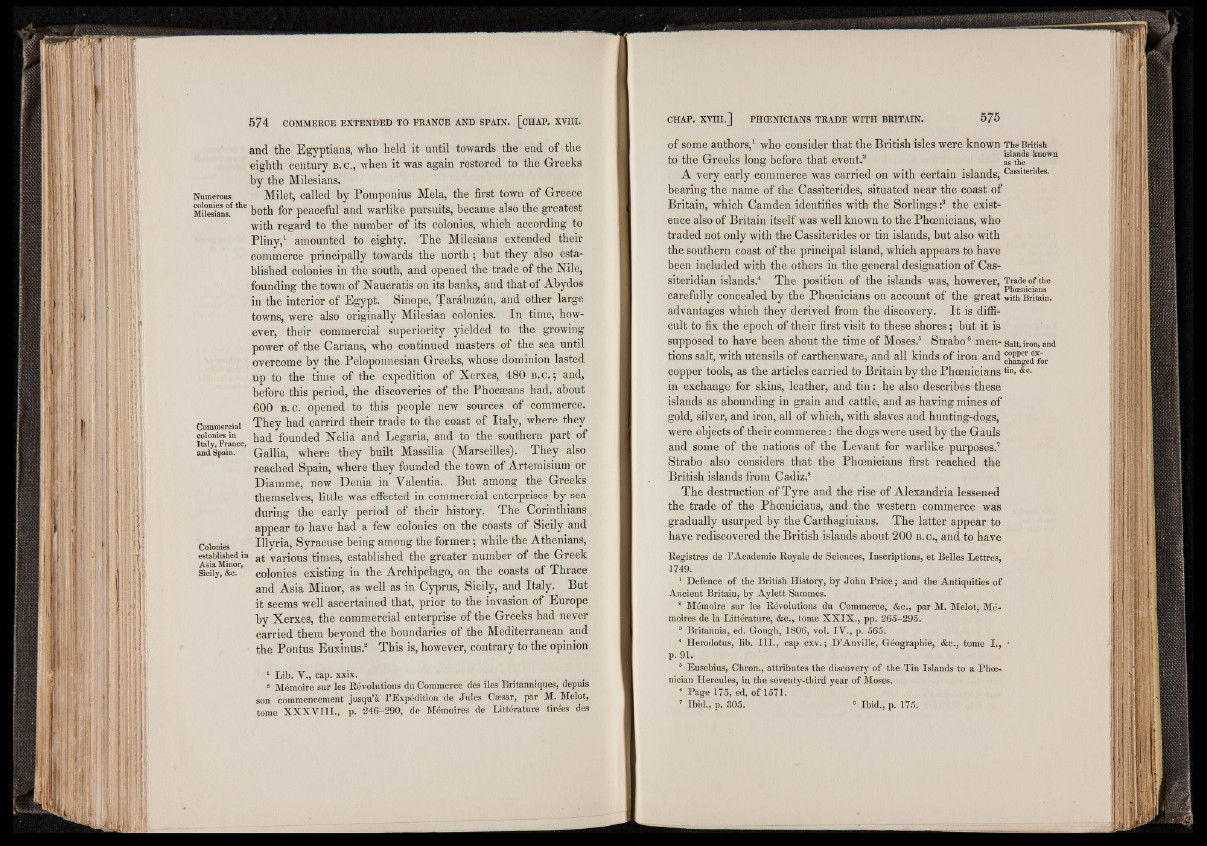
and the Egyptians, who held it until towards the end of the
eighth century B. c., when it was again restored to the Greeks
by the Milesians.
Numerous Milet, called by Pomponius Mela, the first town of Greece
îfeSLa both for peaceful and warlike pursuits, became also the greatest
with regard to the number of its colonies, which according to
Pliny,1 amounted to eighty. The Milesians extended their
commerce principally towards the north ; but they also established
colonies in the south, and opened the trade of the Nile,
founding the town of Naucratis on its banks, and that of Abydos
in the interior of Egypt. Sinope, Tarâbuzun, and other large
towns, were also originally Milesian colonies. In time, however,
their commercial superiority yielded to the growing
power of the Carians, who continued masters of the sea until
overcome by the Peloponnesian Greeks, whose dominion lasted
up to the time of the expedition of XerxeS, 480 b . c . ; and,
before this period, the discoveries of the Phocæans had, about
600 b . c . opened to this people new sources of commerce.
Commercial They had carrird their trade to the coast of Italy, where they
ooWesi^ ka(j foun(jed Nelia and Legaria, and to the southern part of
and^Spam. Gallia, where they built Massilia (Marseilles). They also
reached Spain, where they founded the town of Artemisium or
Diamme, now Denia in Valentia. But among the Greeks
themselves, little was effected in commercial enterprises by sea
during the early period of their history. The Corinthians
appear to have had a few colonies on the coasts of Sicily and
Colonies Illyria, Syracuse being among the former ; while the Athenians,
estabikhedm at varj[ous times, established the greater number of the Greek
Sicily, &c. ’ colonies existing in the Archipelago, on the coasts of Thrace
and Asia Minor, as well as in Cyprus, Sicily, and Italy. But
it seems well ascertained that, prior to the invasion of Europe
by Xerxes, the commercial enterprise of the Greeks had never
carried them beyond the boundaries of the Mediterranean and
the Pontus Euxinus.2 This is, however, contrary to the opinion
1 Lib. V., cap. xxix.
8 Mémoire sur les Révolutions du Commerce des iles Britanniques, depuis
son commencement jusqu’à l’Expédition de Jules Cæsar, par M. Melot,
tome X X X V I I I ., p. 246-290, de Mémoires de Littérature tirées des
of some authors,1 who consider that the British isles were known The B ritish
to the Greeks long before that event.2 Ts* th e * kntrtm
A very early commerce was carried on with certain islands, Cassiterides.
bearing the name of the Cassiterides, situated near the coast of
Britain, which Camden identifies with the Sorlings :3 the existence
also of Britain itself was well known to the Phoenicians, who
traded not only with the Cassiterides or tin islands, but also with
the southern coast of the principal island, which appears to have
been included with the others in the general designation of Cas-
siteridian islands.4 The position of the islands was, however, Trade of the
carefully concealed by the Phoenicians on account of the great with Britain,
advantages which they derived from the discovery. It is difficult
to fix the epoch of their first visit to these shores ; but it is
supposed to have been about the time of Moses.5 Strabo6 men- gait, iron, and
tions salt, with utensils of earthenware, and all kinds of iron and for
copper tools, as the articles carried to Britain by the Phoenicians tin>&c-
in exchange for skins, leather, and tin : he also describes these
islands as abounding in grain and cattle, and as having mines of
gold, silver, and iron, all of which, with slaves and hunting-dogs,
were objects of their commerce : the dogs were used by the Gauls
and some of the nations of the Levant for warlike purposes.7
Strabo also considers that the Phoenicians first reached the
British islands from Cadiz.8
The destruction of Tyre and the rise of Alexandria lessened
the trade of the Phoenicians, and the western commerce was
gradually usurped by the Carthaginians. The latter appear to
have rediscovered the British islands about 200 b . c ., and to have
Registres de l’Académie Royale de Sciences, Inscriptions, et Belles Lettres,
1749.
1 Defence of the British History, by John Price ; and the Antiquities of
Ancient Britain, by Aylett Sammes.
2 Mémoire sur les Révolutions du Commerce, &c., par M. Melot, Mémoires
de la Littérature, &c., tome X X IX ., pp. 265-295.
8 Britannia, ed. Gough, 1806, vol. IV ., p. 565.
4 Herodotus, lib. I I I . , cap cxv. ; D’Anville, Géographie, &c., tome I ., •
p. 91.
5 Eusebius, Chron., attributes the discovery of the Tin Islands to a Phoe-
nician Hercules, in the seventy-third year of Moses.
8 Page 175, ed. of 1571.
7 Ibid., p. 305. 8 Ibid., p. 175.